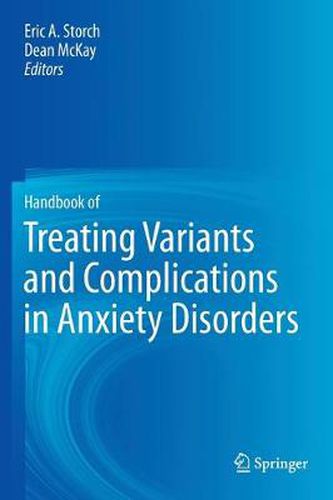Readings Newsletter
Become a Readings Member to make your shopping experience even easier.
Sign in or sign up for free!
You’re not far away from qualifying for FREE standard shipping within Australia
You’ve qualified for FREE standard shipping within Australia
The cart is loading…






This title is printed to order. This book may have been self-published. If so, we cannot guarantee the quality of the content. In the main most books will have gone through the editing process however some may not. We therefore suggest that you be aware of this before ordering this book. If in doubt check either the author or publisher’s details as we are unable to accept any returns unless they are faulty. Please contact us if you have any questions.
As prevalent as anxiety is as a diagnosis, clinically complex cases are even more so. At the same time that it is recognized as a spectrum of disorders with many possibilities for intervention, it is most often seen with variations that further complicate treatment.
The Handbook of Treating Variants and Complications in Anxiety Disorders explains in clear detail how and why clinical factors present challenges to clinicians treating clients with these disorders. Comorbid conditions often found in children, adolescents, and adults with anxiety, including developmental disabilities and personality disorders, are analyzed in the context of treatment. Case examples and literature reviews illustrate the relative merits of integrated versus sequential treatment, the importance of prioritizing behaviors, age-related considerations, and therapist issues. This best-practices approach guides readers in choosing current evidence-based options for treatment that is tailored to the individual and effective in the short and long term. Included in the Handbook:
Prognostic indicators of treatment response for children and adults with anxiety disorders. Treatment of comorbid anxiety and disruptive behavior in youth. Treatment of PTSD with comorbid borderline personality disorder. Limited motivation, patient-therapist mismatch, and the therapeutic alliance. Assessment and treatment of comorbid anorexia nervosa and obsessive compulsive disorder. Treatment of comorbid anxiety disorders across the lifespan.
Developed as a companion reference to the Handbook of Assessing Variants and Complications in Anxiety Disorders, the Handbook of Treating Variants and Complications in Anxiety Disorders is of immediate relevance to researchers, scientist-practitioners, and graduate students in clinical child, school, and developmental psychology; social work; psychiatry; psychotherapy; counseling; and pediatrics.
$9.00 standard shipping within Australia
FREE standard shipping within Australia for orders over $100.00
Express & International shipping calculated at checkout
This title is printed to order. This book may have been self-published. If so, we cannot guarantee the quality of the content. In the main most books will have gone through the editing process however some may not. We therefore suggest that you be aware of this before ordering this book. If in doubt check either the author or publisher’s details as we are unable to accept any returns unless they are faulty. Please contact us if you have any questions.
As prevalent as anxiety is as a diagnosis, clinically complex cases are even more so. At the same time that it is recognized as a spectrum of disorders with many possibilities for intervention, it is most often seen with variations that further complicate treatment.
The Handbook of Treating Variants and Complications in Anxiety Disorders explains in clear detail how and why clinical factors present challenges to clinicians treating clients with these disorders. Comorbid conditions often found in children, adolescents, and adults with anxiety, including developmental disabilities and personality disorders, are analyzed in the context of treatment. Case examples and literature reviews illustrate the relative merits of integrated versus sequential treatment, the importance of prioritizing behaviors, age-related considerations, and therapist issues. This best-practices approach guides readers in choosing current evidence-based options for treatment that is tailored to the individual and effective in the short and long term. Included in the Handbook:
Prognostic indicators of treatment response for children and adults with anxiety disorders. Treatment of comorbid anxiety and disruptive behavior in youth. Treatment of PTSD with comorbid borderline personality disorder. Limited motivation, patient-therapist mismatch, and the therapeutic alliance. Assessment and treatment of comorbid anorexia nervosa and obsessive compulsive disorder. Treatment of comorbid anxiety disorders across the lifespan.
Developed as a companion reference to the Handbook of Assessing Variants and Complications in Anxiety Disorders, the Handbook of Treating Variants and Complications in Anxiety Disorders is of immediate relevance to researchers, scientist-practitioners, and graduate students in clinical child, school, and developmental psychology; social work; psychiatry; psychotherapy; counseling; and pediatrics.